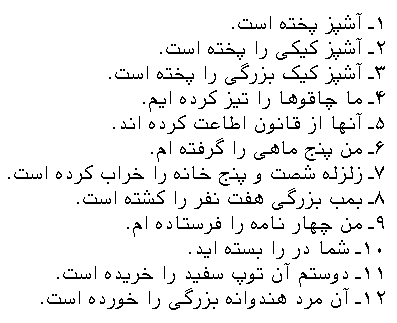As you know, practice makes perfect! These useful drills present even more words and phrases than covered in this week’s lesson. This will not only build your Persian vocabulary, but also help you learn to read and write Farsi more quickly and confidently.
Note: Before doing these homeworks, make sure you have learned the previous words fluently.
New words:
Pokhtan Eta at kardanTo obey ‘something’ = ![]() /æz ‘something’ eta: æt kærdæn/.
/æz ‘something’ eta: æt kærdæn/.
Please translate the following sentences into Persian.
You already know how to use the rule. You may find the answers below.
- The cook has cooked.
- The cook has cooked a cake.
- The cook has cooked a big cake.
- We have sharpened the knives.
- They have obeyed the law.
- I have caught 5 fish.
- The earthquake has destroyed 65 houses.
- A big bomb has killed 7 people.
- I have sent 4 letters.
- You have closed the door.
- My friend has bought that white ball.
- That man has eaten a big watermelon.

Nadar Shah
November 19, 2012 @ 1:16 am
This is a great wesite for learning Persian. Hassan has made it very easy for biginners and advance learners. I highly recommend this site to the people who are willing to learn Farsi.
Debora Lutz
August 29, 2013 @ 9:42 am
Hassan, all the links in Lesson 29 seem to be broken :(
Hassan H.
August 30, 2013 @ 3:31 pm
I’ve fixed the links. Everything should be working now. Thank you.
shannon
July 8, 2014 @ 7:42 am
Hi could anyone tell me why raa is used with “a cake” in number 2 of the quiz? It is not a definite object so I thought raa should be omitted.
shannon
July 8, 2014 @ 7:45 am
Also, “a big cake” is referred to as “keik e bozorgi” in number 3 of the quiz. I didn’t think this was right ???
Thomas
February 13, 2015 @ 8:59 am
Hassan, once more, all my congratulations for your website. I appreciate that the lessons are a bit shorter and easier, it lets me some time to learn properly all vocabulary before moving ahead. My only doubt at that point is the big focus that you are doing on grammar (different tenses, rules to be applied etc.). This is of course useful but I realize that I’m not able at this stage to say “how are you ?”, “thanks a lot”, “how to go there” and such daily expressions. Anyway, I trust your method and will continue to follow it. I guess this will come step by step.